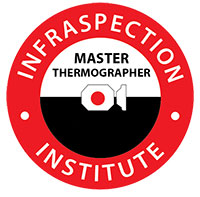- Home
- About
- Courses
- Infrared Training & Certification
- CERTIFICATION COURSES
- Locations and Dates
- Open Enrollment
- Distance Learning
- On-Site Courses
- Scholarship for Veterans
- Refresher Courses
- Registration
- IR/INFO CONFERENCE
- Software
- EXPERT SERVICES
- STANDARDS
- Proposal Templates
- Electrical Systems and Rotating Equipment
- Building Envelopes
- Insulated Roofs
- Photovoltaic Systems
- Pest Detection
- Yachts and Small Craft
- Thermal Imaging of Horses
- Optical Gas Imaging
- Measuring Reflected Temperature
- Measuring Emittance
- Measuring Transmittance
- Distance/Target Size Ratios
- Complete Series
- Resources
- BUSINESS OPPORTUNITIES
- STORE
There are a number of standards and specifications published for infrared thermography. Currently, standards exist for the certification of personnel, operation of equipment, and inspections of electrical, mechanical, and structural systems. Recognizing the need for standardized procedures, Infraspection Institute began publishing guidelines for thermography in 1993. Since their initial publication, Infraspection Institute guidelines have been adopted by hundreds of companies worldwide and incorporated into documents published by recognized standards organizations such as ASTM International (ASTM). Beginning in 2007, Infraspection Institute guidelines were updated and renamed as standards to reflect their industry-wide acceptance and the best practices they embody.
Twelve comprehensive standards are now available from Infraspection Institute. These documents cover equipment operation, temperature measurement, and specific thermographic applications. The selection and use of applicable standards, specifications, and guidelines are taught in all Infraspection Institute courses.
Yes. Continuing Education Credits are available for several of our infrared training courses. Organizations that recognize Infraspection’s thermography training courses include: the InterNational Association of Certified Home Inspectors (InterNACHI), the InterNational Electrical Testing Association (NETA), the International Institute of Building Enclosure Consultants (IIBEC), and the Society for Maintenance and Reliability Professionals (SMRP). Students who complete and achieve a passing exam grade for our Level I, Level II, and Level III infrared training courses will earn 20 points per course toward initial membership in the Infraspection Institute Master Thermographer® program.

New Jersey based Level I, II, and III open-enrollment training courses are held at several times throughout the year at The Conference Center at Mercer. The Conference Center is located at Mercer County College, 1200 Old Trenton Road, West Windsor, NJ. The Conference Center is easily reached from major highways and is approximately 50 miles from both Philadelphia International and Liberty International Airports. Trenton Mercer Airport is approximately 13 miles from The Conference Center. Infrared training classes are also available at several locations worldwide through companies who are licensed to teach using Infraspection Institute training materials. Locations and dates may be found on our course schedule page.
Yes! In addition to our Level I, II, and III Certified Infrared Thermographer® Courses, Infraspection Institute can also provide customized on-site training at your facility. With an on-site class, our Level III instructors will travel to your facility and can customize our training courses to meet your company’s particular needs. Whenever possible, we will work with your on-site staff to conduct field trips and address your company’s particular applications. On-site training provides a cost-effective alternative to attending open-enrollment classes. On-site classes may be conducted for any number of students and are generally cost-effective with classes of 5 or more students.
Infraspection Institute was the world’s first company to offer Distance Learning Courses for thermography. Presently, we maintain the world’s largest inventory of online training courses. We utilize state-of-the-art web servers and dynamic multimedia resources to provide a unique, quality educational experience. Our Distance Learning Courses are based upon our Level I, II, and III infrared training course content and meet all ASNT training requirements for the certification of NDT personnel. All Distance Learning courses are taught by Infraspection Institute Level III Certified Infrared Thermographers® each having over 20 years of professional experience.
All Distance Learning Courses are divided into narrated 1-hour units allowing you to work at a pace that’s convenient for you. With our Distance Learning Courses, you can tailor your infrared education through our wide selection of application and industry-specific courses.
Tuition for Infraspection open enrollment infrared training courses includes the following: All course materials including Student Reference Manual, Certified Infrared Thermographer® Exam at end of course, a trial copy of TI Reporter™ thermography reporting software, and Continental Breakfast and Lunch during the course.
On-site courses include the above plus field trips. Meals and meeting space can be provided upon request.
Distance Learning Courses include the following: Student Reference Manual, multi-question online quizzes for each course unit,TI Reporter™ software, hands-on experiments utilizing provided materials, instructions for self-directed learning activities, and written proof of course completion.
When you consider everything Infraspection Institute has to offer, there really is no other choice for infrared training. Whether you are a beginner or a seasoned professional, our courses and services are without equal in the infrared industry. We offer unbiased, state-of-the-art training and support services that are applicable to imagers of any type or age. With over 40 years experience in infrared training, technical consulting, standards development, and software publishing, we can help you get the most from your infrared inspection program. Give us a call and find out what thousands of other thermographers already know.

Professional Curriculum
Infraspection Institute instructors use extraordinary techniques to deliver stimulating, effective, and relevant instruction. All of our instructors are highly experienced, practicing thermographers. Each brings years of unmatched, real-world experience to the classroom. Our courses are taught using a combination of dynamic multi-media presentations, hands-on demonstrations and one-on-one interaction with students. Our courses integrate theory, practice, and case studies in a fun, relaxed atmosphere designed to maximize your learning experience.
